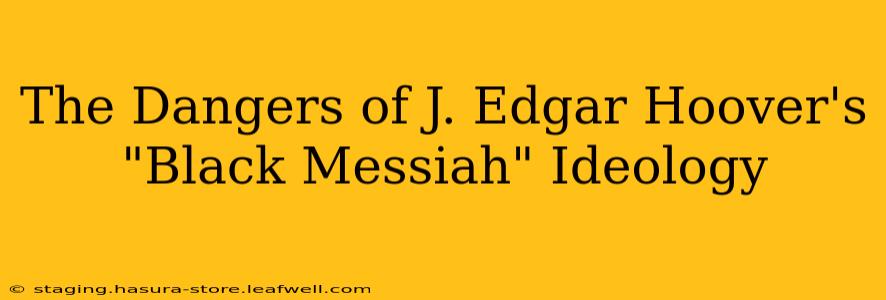J. Edgar Hoover, the long-serving Director of the Federal Bureau of Investigation (FBI), wielded immense power and influence over American society for decades. While lauded by some for his contributions to law enforcement, a darker side to his legacy involves his manipulation of the concept of a "Black Messiah" to sow fear and division, ultimately undermining civil rights and democratic processes. This ideology, far from being a fringe belief, was a core component of Hoover's strategy, shaping his actions and profoundly impacting the nation.
What was Hoover's "Black Messiah" Ideology?
Hoover's "Black Messiah" theory stemmed from a deep-seated fear of Black empowerment and the growing Civil Rights Movement. He believed that a charismatic Black leader would emerge, potentially inciting widespread violence and revolution, thus destabilizing the nation. This fear wasn't based on rational evidence but rather fueled by his conservative worldview and ingrained racism. He systematically monitored and surveilled Black leaders, activists, and organizations, often twisting their words and actions to fit his narrative. The goal wasn't just surveillance; it was to discredit and neutralize anyone perceived as a potential threat to his vision of social order.
How did Hoover utilize this ideology?
Hoover's strategy involved several key components:
- Infiltration and Disruption: The FBI infiltrated numerous Black organizations, using informants to gather intelligence and sow discord within the movement. This tactic aimed to weaken the collective power of activists and undermine their effectiveness.
- Surveillance and Harassment: Leaders like Martin Luther King Jr. were subjected to relentless surveillance, their private lives scrutinized and their reputations attacked through leaked information and carefully crafted disinformation campaigns.
- Dissemination of Propaganda: Hoover leveraged his influence within the media to shape public perception, often portraying Black activists as dangerous radicals and threats to national security. This narrative served to justify his aggressive tactics and to garner public support for his actions.
Why was this ideology so dangerous?
Hoover's "Black Messiah" ideology was dangerous for several reasons:
- Suppression of Civil Rights: By portraying Black activists as subversive elements, Hoover effectively hindered the progress of the Civil Rights Movement. His actions legitimized repressive measures and created an environment of fear and intimidation.
- Erosion of Trust in Government: Hoover's tactics violated basic democratic principles and eroded public trust in government institutions. His abuse of power demonstrated a disregard for individual rights and due process.
- Promotion of Racial Division: The constant portrayal of Black leaders as dangerous figures exacerbated racial tensions and contributed to a climate of suspicion and hostility. This undermined efforts toward racial reconciliation and social justice.
Was Hoover's fear justified?
The historical record clearly shows that Hoover's fear of a "Black Messiah" leading to widespread violence was unfounded. The Civil Rights Movement, despite facing immense opposition, largely employed non-violent methods of resistance. Hoover's actions, rather than preventing violence, often exacerbated tensions and created an environment conducive to conflict.
What are the lasting consequences of Hoover's ideology?
The legacy of Hoover's "Black Messiah" ideology continues to resonate today. His actions highlight the dangers of unchecked government power, the insidious nature of racism within institutions, and the devastating consequences of manipulating information to sow fear and division. Understanding this dark chapter in American history is crucial for fostering a more just and equitable society.
How did Hoover's actions affect the Civil Rights Movement?
Hoover's actions significantly hampered the Civil Rights Movement, not through direct violence, but through calculated efforts to undermine its leaders and discredit its goals. His campaign of surveillance, infiltration, and disinformation created an environment of fear and mistrust, hindering the progress of the movement and contributing to the violence it sometimes faced.
What lessons can be learned from Hoover's actions?
Hoover's legacy serves as a stark reminder of the dangers of unchecked power and the importance of safeguarding individual liberties. It highlights the need for transparency and accountability within government institutions and underscores the critical role of a free and independent press in challenging narratives of fear and division. His actions should serve as a cautionary tale for future generations, emphasizing the importance of critical thinking and resisting the manipulation of information.

